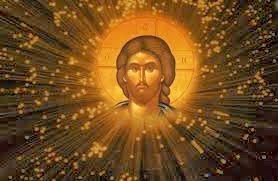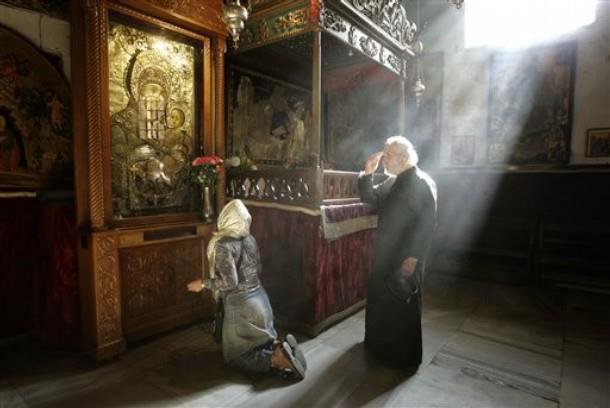Our subject is about miracles. What kind of miracles, beloved? If you make the effort and visit a sacred shrine at which there are holy relics that have the grace to perform miracles or expel demons, you will hear people at the place talking about the miracles of the saint. They will remember all of the details… “Do you know – they will tell you- it wasn’t long ago that they brought an unfortunate young man to the Saint. He looked awful. His eyes were wild. He was foaming at the mouth. He was grinding his teeth. His body was convulsing. They had him chained. But at the height of the crisis he broke those heavy chains as though they were strings. He was human, but he seemed like a beast. Or something worse. He was possessed. But when the litany took place and the relics passed over him where he was lying, he started to scream horribly: O, Holy One! You burned me… And after the screams and the convulsions, the young man became well. He was completely peaceful. The demon had come out of him. And he is not the only who is possessed by demons. There are others that the saint has cured. He is, you see, a wonder-worker. He is a great dispossessor of demons…”
*******************
These are the things that the man, the friend of the saint, says about the miracles of the saint in his locale. Very well. We do not question the miracles, the actual miracles of the saint. But you who are amazed at the miracle of the expulsion of the demons, are asked to marvel at a miracle which is greater than these, which takes place at these holy shrines. What is it? We are not saying this, but St. John Chrysostom. He says that the sin that every man commits is a “great demon.” The holy father does not personify sin in a poetic way and denies the existence of the Devil, because St. John Chrysostom does believe in the existence of demons, but because sin brothers and moves and brings about more catastrophes that the Devil. He, certainly, instigates and stirs up the fire of sin within us, and enters into man’s heart through it, but it is through the consent of man’s will which has the greatest responsibility for it. Sin should have stayed out of the dwelling place of the soul. This demon should stay out of it. From this point of view, this sin is called “the great demon.” And how difficult is the expulsion, the uprooting of the sin, any sin that has its roots in the heart of man! The evil nests inside the person far worse than the demons in the few cases of the demoniacs. Would you like an example? Take a small devil. We call smoking a small devil. It is known how much damage this small devil does. Ask one of your friends now, a heavy smoker, to stop smoking. That is to say, to expel the demon of smoking. Will he be able to do it? How many people does this small demon conquer! That is why, we repeat, the expelling of sin from the heart, is – according to St. John Chrysostom – a greater miracle than the miracle of the expulsion of demons. “If you uproot sin, you are greater than those that have the ability to expel myriads of demons.” (P. G. Migne 58, 387)
Oh Christian of Cephalonia and of any other island or city that boasts of the miraculous powers of their patron saint, you can perform greater miracles if you want to. Fight your passions and evils. For by defeating them, you defeat legions of demons, you put foreign armies to fight. (Hewbrews 11:34)
Would you like to continue the comparisons between great and small miracles? Listen, please, to other instances, too.
If you see a patient whose hand is totally paralyzed suddenly become well against all of the predictions of the doctors, you will shout: this is a miracle! And certainly it is a miracle. But there is an even greater miracle. What is it? Do you see that avaricious person? He has never given to charity. His hand is paralyzed when it comes to doing good. And if suddenly see this stingy man opening his purse, opening his barns, and distributing his surplus goods, won’t this be a miracle? A hand that never gave alms now giving alms? A hand that stinginess had paralyzed now moves and works for the benefit of others? Why is it that you are more astonished by the miracle of the cure of a paralytic and you are not astonished even more at the spiritual cure and the moral change of an avaricious man into a generous one?
Here is another example. There is someone who is lame, who cannot talk easily. If he suddenly becomes well, his lameness is gone and you see him walking freely, you say that a miracle has happened. But here is a person who for years has not come to church. He is like the lame man. Worse than the  lame man, the cripple. Because we have even seen invalids ask and be brought to the places of worship from their homes on the great holy days. While he does not even take a step toward church. But suddenly, he who has not gone to church in over twenty years, runs with gladness and joy like a deer to the dwelling place of the Lord. Is not this spiritual change of the man a miracle? His spiritual lameness was cured, which the Prophet Elias censured in the past (3 Kings 18: 21). And now with a steady and sturdy step walks on the road of the Lord.
lame man, the cripple. Because we have even seen invalids ask and be brought to the places of worship from their homes on the great holy days. While he does not even take a step toward church. But suddenly, he who has not gone to church in over twenty years, runs with gladness and joy like a deer to the dwelling place of the Lord. Is not this spiritual change of the man a miracle? His spiritual lameness was cured, which the Prophet Elias censured in the past (3 Kings 18: 21). And now with a steady and sturdy step walks on the road of the Lord.
Now here is a fourth miracle. There is a person who goes to the movies regularly. His eyes are glued on the screen, on the scene, on the actors who stir up the fires of lust. There is a zealous Christian who convinces him that according to the word of the Lord viewing such shameful spectacles is a sin, and that if he wants to see and delight in beauty and loveliness he will find them in another environment, a spiritual one. If he convinces him, and the man stays away totally from those shameful spectacles, and now only looks upon what is decent and right, this zealous Christian performed a miracle. He opened eyes that were closed to virtue and holiness.
And the last miracle. There is someone else who has never gone to hear a sermon. He shuts off his hearing. He hates and abhors the preaching of the Bible. That sad situation continues for years. The man is spiritually deaf. But suddenly a good Christian convinces him to listen to a preacher. From then on he is changed. Now he respects it. He runs to church. His ears are fixed on the holy word. He was deaf and now he can hear. Is not this miracle greater than a deaf man getting cured?
St. John Chrysostom preaches that these kinds of miracles that take place in the spiritual lives of men are the greatest. They are wonderful signs. We should pay great attention to these miracles. By these, Christians become marvelous and great. Through these, sinners are attracted, believe and repent. By these miracles God is glorified.
Unfortunately, today’s Christians do not want to pay any attention to these kinds of miracles. They seek the other kind, the external kind of miracles, and only value and pay attention to them. That is why little spiritual progress is seen today in these Christian groups? They are like the Jewels at the time of Christ who sought miracles continuously, and in spite of all of the miracles that they saw they remained in their unbelief and in the corruption of their hearts without making any progress. They wanted the Lord to satisfy their insatiable curiosity, to see and hear about miracles.
*************
Beloved! At one time there was an unbeliever who ran into a believer. He spoke ironically about his faith to the believer. “I cannot believe the miracles the Bible speaks about – he said. he above all, I cannot accept the idea that God took dirt and made man out of it. Can you believe that he made man out of mud! Can you believe those kind of things?” And the believer answered him: “You cannot believe this miracle. Let me tell you about another miracle. I am dirt, filth, and mire. I was full of sins. However, the Lord took me and with this mud of sin He again made me a man who thinks and feels greater and higher than physical matter…”
The first man was created out of clay. But out of the mire of his deeds, through repentance a new creation, man becomes “a new creature.” That man was made out of the earth, is the first miracle. The second miracle is that the new man was created out of corrupted nature. The second one is greater than the first one.
This chapter was taken from the book ” Miracles ” by Bishop Augoustinos N. Kantiotes
Translation in English by
Rev. Fr. Asterios Gerostergios
Ibmgs


